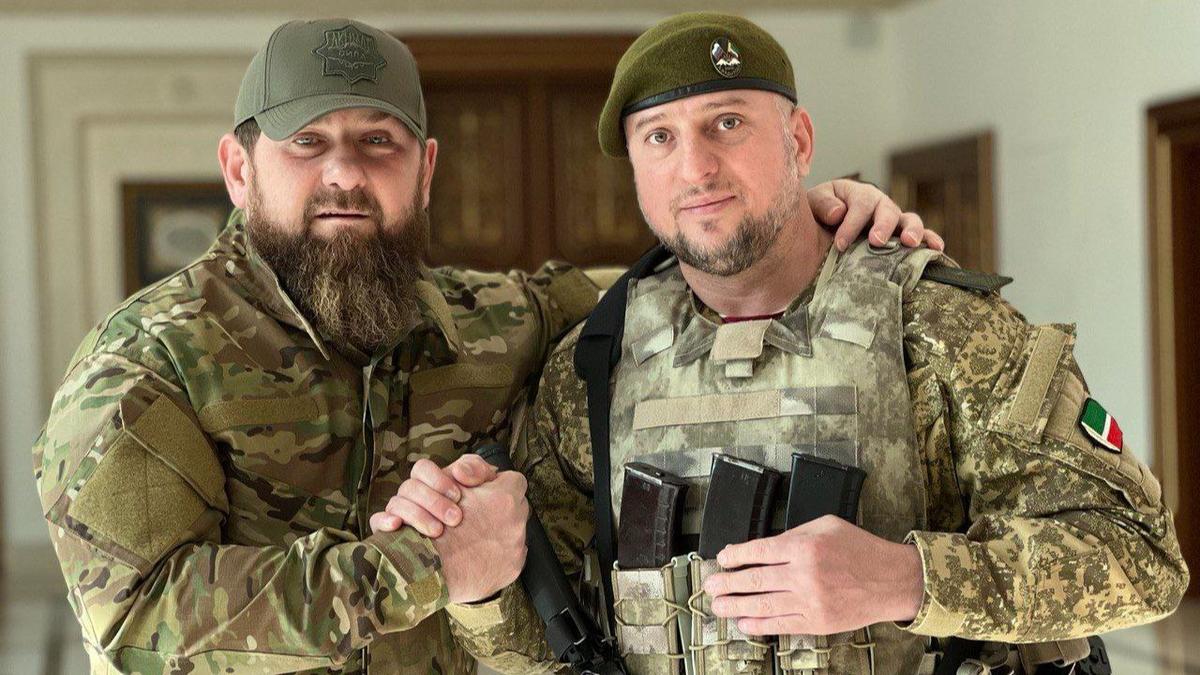Apti Alaudinov, one of the most likely heirs to the Chechen throne in the light of leader Ramzan Kadyrov’s illness, has used the war in Ukraine to earn the Kremlin’s trust and help win back Kadyrov’s favour.
Alaudinov has managed to survive in Chechnya despite initially being on the opposing side to the Kadyrov clan, and even being banished from Chechnya five years ago. As war broke out in Ukraine, Alaudinov finally got a chance to atone for his sins and help Kadyrov save his private army from ruin.
Reformed federalist
Alaudinov joined Ramzan Kadyrov’s team in 2006, at a time when the republic was embroiled in a bitter power struggle.
Despite being born into a military family, Alaudinov played no part in the First Chechen War, but his father and brother, who both died in 1994, were supported and armed by Moscow from the very beginning — unlike the Kadyrov family, who initially fought for Chechnya’s independence.
Kadyrov’s father, Akhmad, who was named mufti of an independent Chechnya during the First Chechen War, even declared jihad, or holy war, on Russia. The young Ramzan was an ardent admirer of guerrilla leader Shamil Basaev, but didn’t fight, as his father kept both of his sons out of the war.
Alaudinov didn’t change the family tradition in the Second Chechen War, continuing to support the federal troops. Kadyrov Sr. switched sides at the outbreak of the second campaign, offering his services to the Russian government before his death in 2004.
By 2006, a clear conflict had arisen between different factions in Chechnya — one represented by incumbent president Alu Alkhanov, supported by the Chechen security forces, who fought on Russia’s side in the two Chechen wars, and the other by young deputy prime minister, Ramzan Kadyrov, whose power base relied on amnestied Chechen militants.
The conflict finally reached its climax that same year, with Kadyrov effectively seizing power and threatening to kill Alkhanov if he set foot in Chechnya, while Moscow remained silent.
This was when Alaudinov understood it was time to switch to the winning team — and the best way to do that was to present the head of another sworn enemy of Kadyrov on a platter.
Alaudinov, who worked at the Chechen Interior Ministry’s organised crime unit at the time, opened an investigation into one of Kadyrov’s deadliest rivals, special forces commander Movladi Baisarov. Like Alaudinov himself, Baisarov had been a Chechen federalist and headed a unit under the direct supervision of the Russian Federal Security Service (FSB).
Baisarov didn’t live long enough to stand trial — he was gunned down in Moscow in November 2006. The investigation showed the shooters to be employees of the Chechen Interior Ministry. The operation was led by Kadyrov’s right-hand man Adam Delimkhanov, while eyewitnesses claim Alaudinov himself was present.
Nobody was charged with murder, as the Interior Ministry officers testified they had come to detain Baisarov, who allegedly resisted arrest and was shot dead in the ensuing melee.
It was the first of many hits on Kadyrov’s political rivals, which culminated in his wielding absolute power in Chechnya.
When he became head of the republic in 2007, he thanked Alaudinov more than generously. Within four years, Alaudinov had risen to the post of Deputy Minister of the Chechen Interior Ministry and was the youngest police general in Russia.
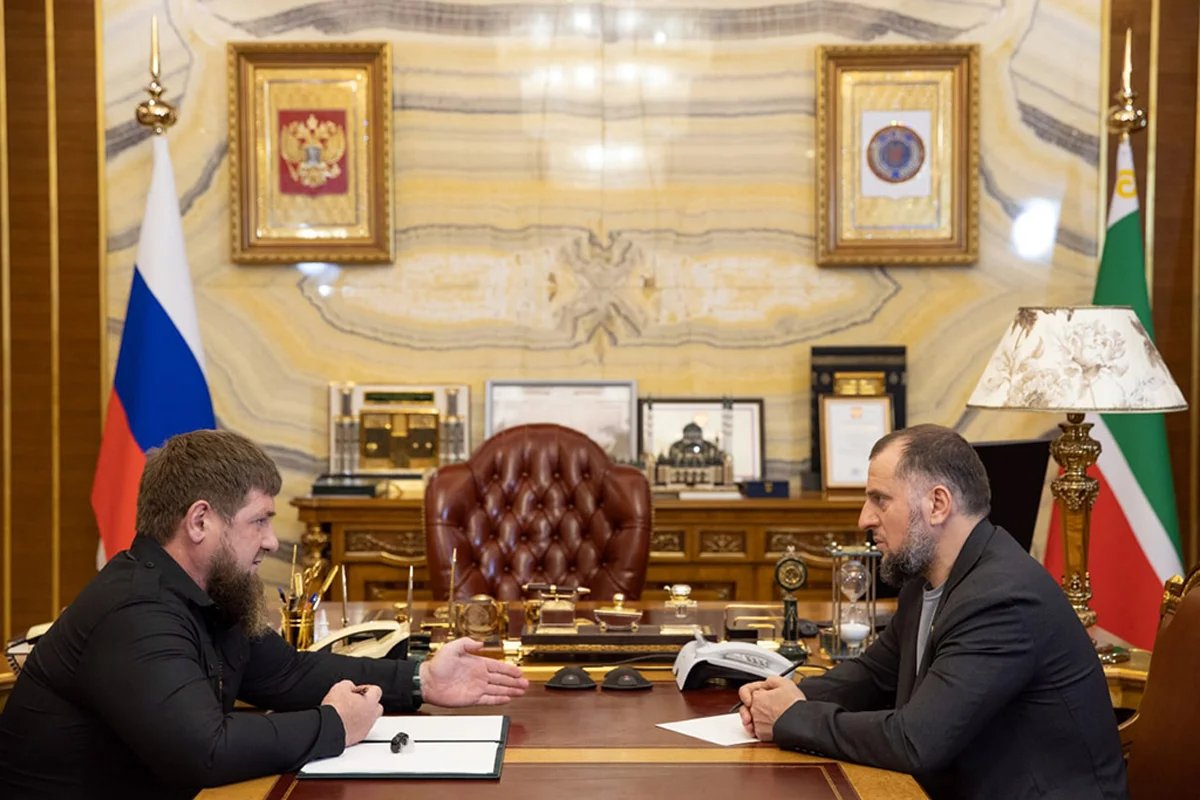
Ramzan Kadyrov and Apti Alaudinov. Photo: Kadyrov’s press service
A source in Chechen law enforcement told Novaya Gazeta Europe that Alaudinov’s real job consisted of “punishment missions” set out by Kadyrov. Alaudinov’s sphere of influence covered the eastern part of Chechnya, while another Kadyrov ally, parliament speaker Magomed Daudov, dealt with matters in western Chechnya.
“Everything that can be attributed to these men was done on their master’s instructions,” the source said.
But Alaudinov’s career in Chechnya came to an abrupt end in 2019, as he and his family lost their cushy jobs, expensive properties, and business interests — all because of the decades-old conflict between amnestied militants and federalists.
Falling out of favour
In July 2019, Kadyrov sacked Ibragim Temirbaev, the mayor of Argun, Chechnya’s second city — officially for corruption — and appointed a member of the Kadyrov clan, 28-year-old Khas-Magomed Kadyrov, in his place.
Kadyrov then got hold of a wire tap of conversations between Temirbaev and regional officials. An enraged Temirbaev talked openly of Kadyrov and his out-of-control family.
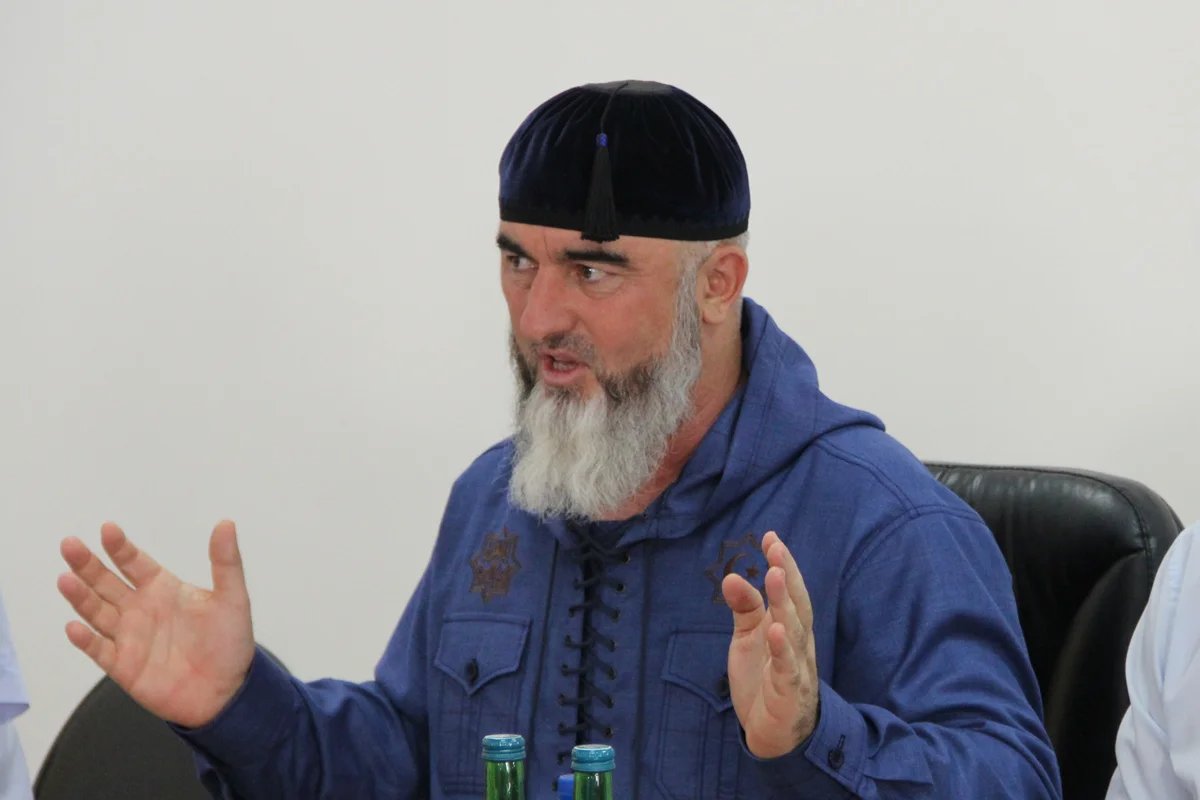
Ibragim Temirbaev. Photo: Argun municipality
Most of the people Temirbaev spoke to had one thing in common: they had all been in the federal camp in the two Chechen wars. Some of them were present at the meeting with Kadyrov’s foe Alu Alkhanov in 2006, where pro-Russian Chechen security officers discussed possible ways to get rid of the Kadyrov clan.
Temirbaev’s lack of restraint didn’t go unnoticed: anyone he spoke to in that period was detained, and Temirbaev himself was killed in a “car accident” two years later.
Alaudinov was one of the highest-ranking officials detained in the summer of 2019. That and the fact that the “purge” of the Chechen elite had become common knowledge meant getting rid of him altogether would have raised too many awkward questions. He officially remained in his post for another two years, until March 2021. Initially, he publicly repented, swore his undying love to Kadyrov and tried every which way to absolve himself of his guilt. He even wrote poems to the leader.
Kadyrov didn’t let Alaudinov back into the inner circle, but at least he didn’t kill him. Alaudinov retained his salary and seniority bonus without showing his face at the Chechen Interior Ministry after August 2019.
Alaudinov left Chechnya, settled in Moscow and until March 2022 lived the quiet life of “a respectable pensioner”.
Atoning for sins
When Russia launched its full-scale invasion of Ukraine in February 2022, Daniil Martynov, the commander of the Chechen National Guard detachments, promised Kadyrov in a phone call that he would invite him to “dance to Chechen music” on Khreshchatyk, Kyiv’s main thoroughfare.
However, it soon became apparent there would be no Chechen folk dances or parades in Kyiv. Within two weeks, Martynov was back in Grozny, telling Kadyrov the Russian army was in total disarray.
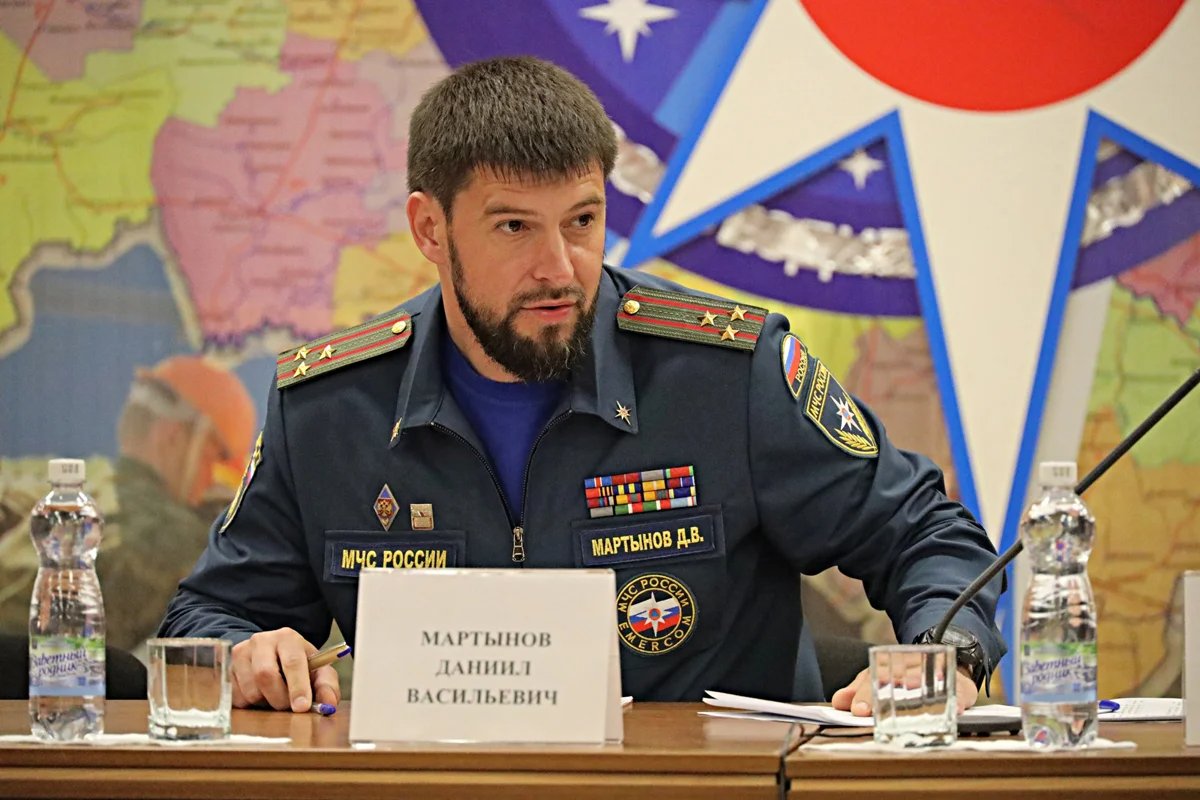
Daniil Martynov. Photo: the Russian Ministry of Emergency Situations
Kadyrov quickly realised that a long and drawn-out war would require manpower, and that having held so many military parades in Grozny, he could easily lose his main asset — his armed men, tied to the Interior Ministry and National Guard in name only.
But while Moscow licked its wounds at the failed blitzkrieg, Grozny got straight down to business.
The ranks of former Chechen police officers provided a rich vein of recruits, who were lured with more than just money. Chechnya came up with the system of people atoning for their sins by fighting in the “special military operation”. This way, the Chechen authorities could enlist those who had got on the wrong side of Kadyrov and those hiding out in the republic because of problems with the Russian law, of whom there had never been a shortage.
This practice was later adopted by mercenary chief Yevgeny Prigozhin and then by the Russian authorities, but Kadyrov was the pioneer.
Less than a month after the war began, in March 2022, Kadyrov published a photo of himself with the disgraced Alaudinov for the first time in years, calling him his “dear brother” and announcing that he would “lead thousands of Chechen volunteers in the special operation to denazify and demilitarise Ukraine”.
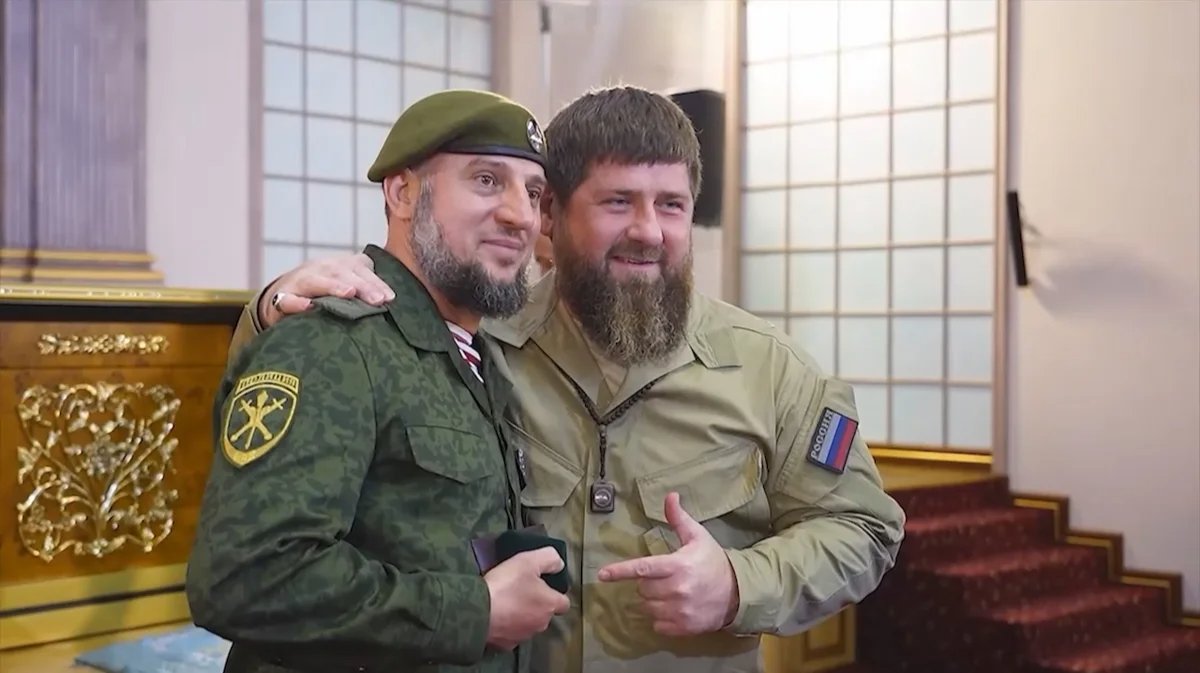
Apti Alaudinov and Ramzan Kadyrov. Photo: Ramzan Kadyrov / Telegram
Many observers assumed that Alaudinov had gone to war to give himself a chance at getting back into Kadyrov’s inner circle. Alaudinov himself said that he, a 48-year-old retiree and sole breadwinner in a large family — he has 12 children — left a cushy life in Moscow when he first saw coffins coming back to Chechnya.
Alaudinov said he had not signed a contract and vowed to fight for free.
“It was my vow before God that I was going to a holy war and I needed nothing for it but the gratitude of the Almighty,” he said.
By July 2022, Kadyrov’s entire core of fighters was back from its “holy war”. They all received honours from Kadyrov and Putin, if not the Almighty. Alaudinov was made secretary of the Chechen Security Council and became an “honorary citizen of Chechnya”.
Two months later, he went back to Ukraine and was appointed commander of the Akhmat volunteer special forces unit. The unit was key to Kadyrov saving his own “army” — this is why he needed someone he could both rely on, but also someone he wouldn’t mind putting in danger.
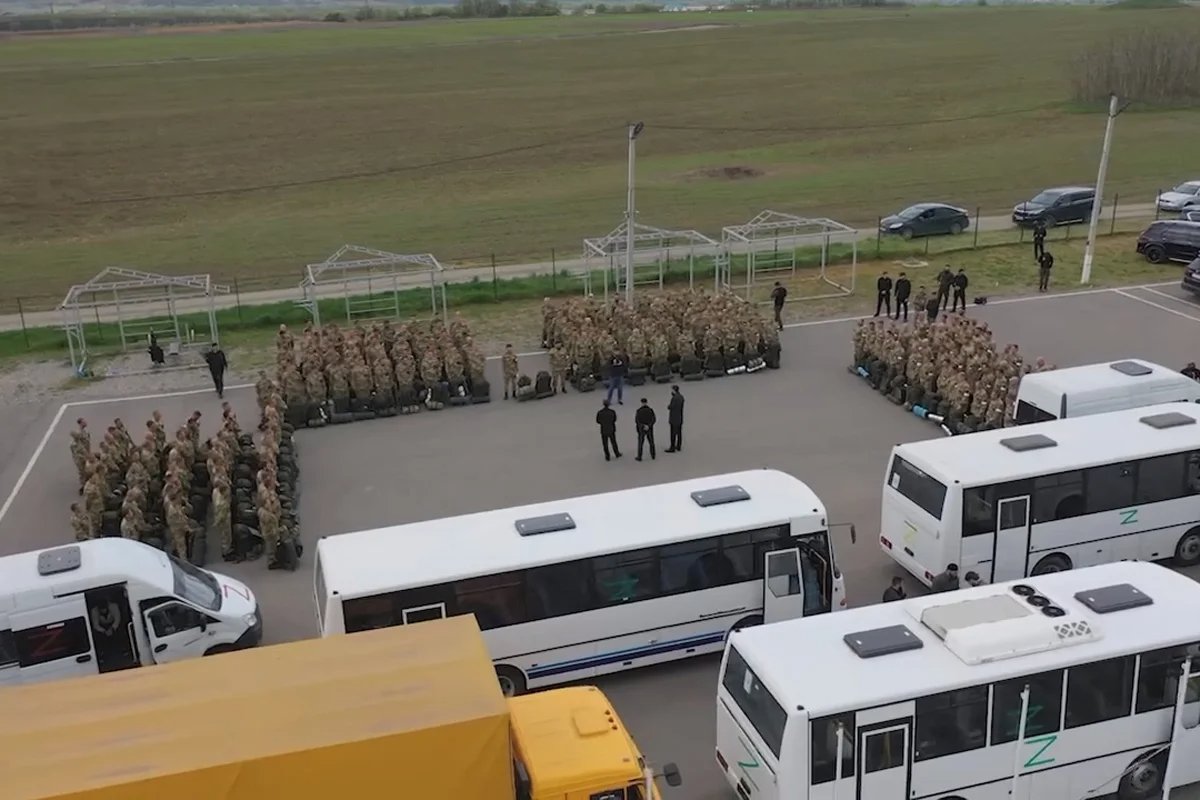
Volunteers getting ready to be sent to Ukraine from the base in Gudermes, Chechnya. Photo: Ramzan Kadyrov / Telegram
Phantom soldiers
By the autumn of 2022, the Chechen authorities had come up with a unique strategy that allowed Kadyrov to maintain his reputation as a loyal Putin footsoldier while still preserving his army.
The simple but effective strategy involved recruiting volunteers of various ethnicities, though chiefly Russians, yet still recording them as Chechen volunteers when they got to Ukraine.
In early April 2022, a mobilisation centre opened at the Russian Special Forces University training ground in the Chechen town of Gudermes. It began an intensive PR campaign to recruit soldiers to the “holy war”, with no requirements and the promise of excellent pay.
The money for this so-called good cause came from the local budget, which Kadyrov, secure in the knowledge that Putin has granted him impunity, had always managed at his own discretion. That now proved decisive. While other governors looked for extra-budgetary funding and the Russian bureaucratic machine was still just setting up similar recruitment centres around the country, the system was up and running in Chechnya and sending up to 200 fighters a week to Ukraine.
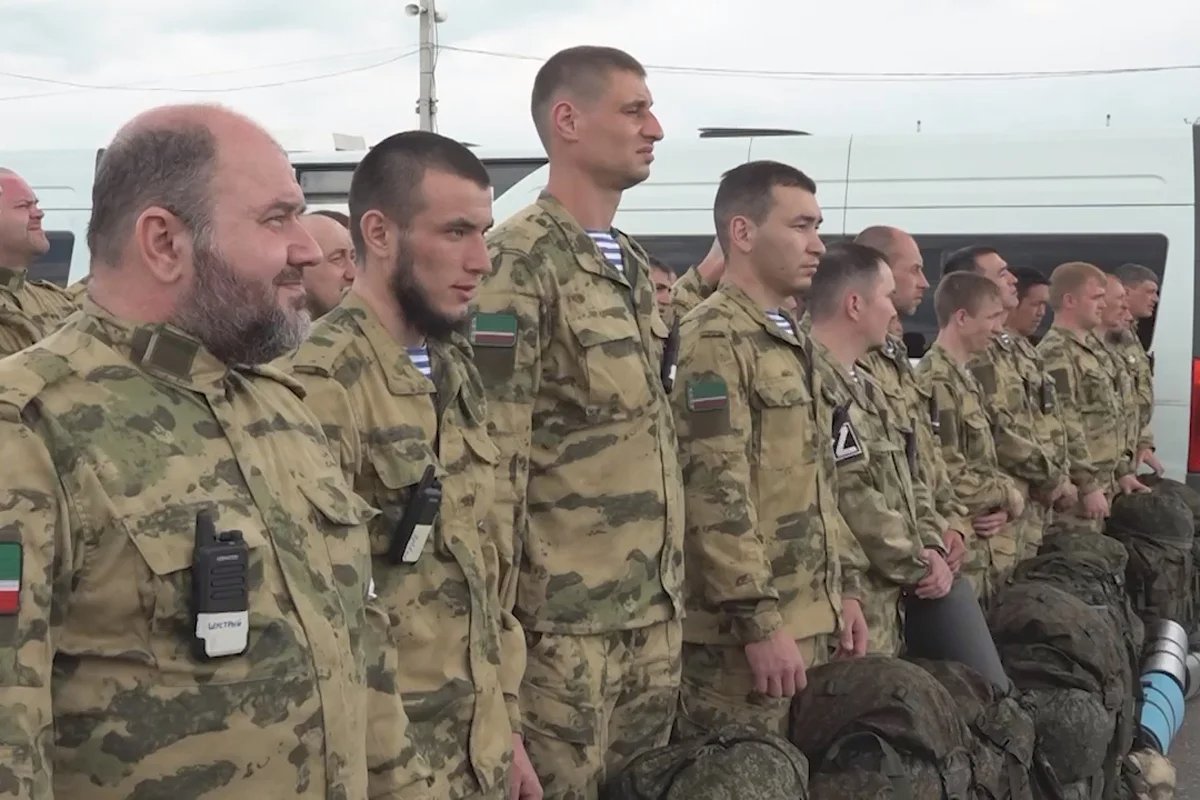
Volunteers at a training ground in Gudermes. Photo: Ramzan Kadyrov / Telegram
But just one Akhmat special forces unit wasn’t enough to demonstrate that Kadyrov’s “foot soldiers” were actively involved in Putin’s war. Kadyrov began to create more armed units, consisting solely of locals. In a little over a year from the outbreak of hostilities, Kadyrov claimed to have formed three Defence Ministry battalions and regiments and three National Guard units.
All of these units, including that of the volunteers, had Akhmat in their name. There were eventually so many that they became virtually indistinguishable.
This was done deliberately to create the impression that a large number of armed formations on the Ukrainian front were directly associated with Kadyrov.
The soldiers fighting for Kadyrov in Ukraine also have one privilege that neither professional soldiers, nor conscripts, nor Russian prisoners have. The Chechen units are not subject to indefinite, life-long contracts, whereby the only way home from the war is due to injury or in a coffin.
The Chechen battalions have regular troop rotation, meaning the authorities can preserve their fighters and skew the figures. While on paper it may look like the Chechen authorities have sent over 40,000 fighters to Ukraine, the true number is three or even four times lower, as a volunteer can return to Chechnya and sign several short-term contracts.
Another detail is even more key.
The overwhelming majority of Akhmat forces the Chechen authorities nurture with such fanfare do not actually see combat on the front line.
Military analyst Ruslan Leviev, founder of the Conflict Intelligence Team military think-tank, says that based on the footage Chechen fighters send from Ukraine, they are mostly deep in the hinterland.
Only one unit with direct links to Kadyrov actually does see combat: the Akhmat volunteer special forces, only 15% of whom are Chechens, according to Alaudinov.
The way Chechens end up as Akhmat volunteers tells us everything we need to know about how Kadyrov really views the war in Ukraine.
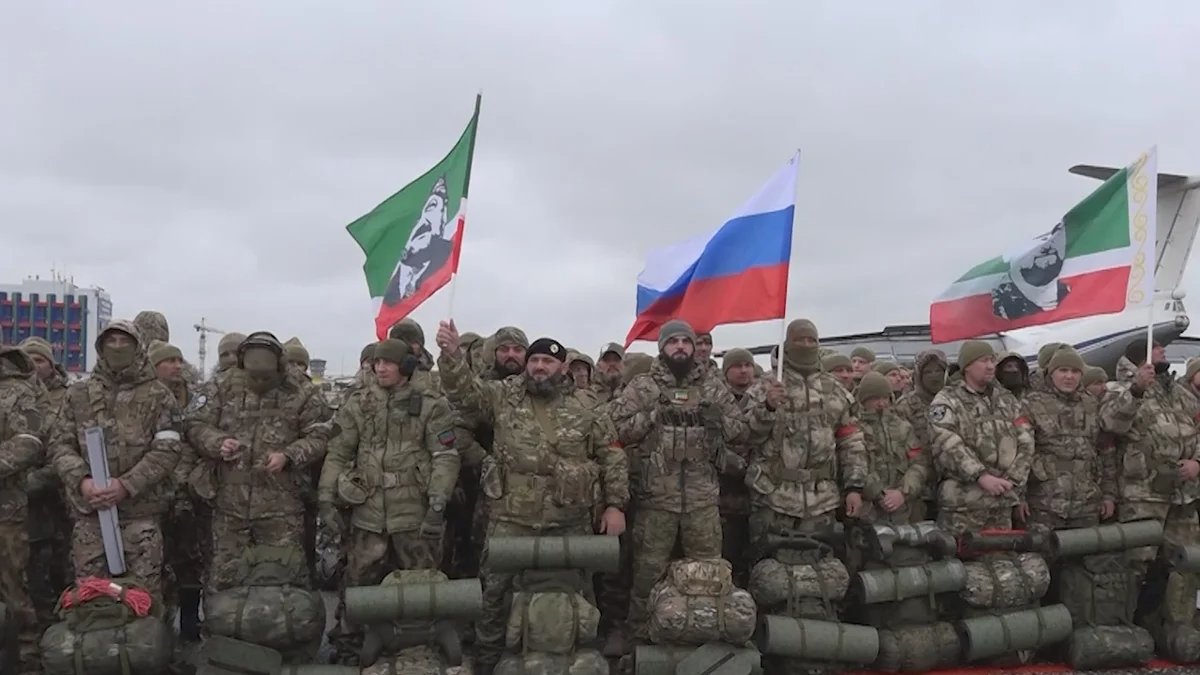
Volunteers from Grozny ready to be shipped out to Ukraine, March 2024. Photo: Ramzan Kadyrov / Telegram
Imam with a machine gun
By late 2022, news had emerged from Chechnya about Chechens who had got on the wrong side of the authorities, and relatives of Kadyrov’s critics and political rivals, being forced to go to war.
Putin’s holy war, the same war from which Kadyrov had strenuously protected his eldest son, now of age, and numerous other adult relatives and even his closest associates, had become the ultimate form of punishment in Chechnya. The Chechens sent to Ukraine as volunteers receive no military training at the Russian Special Forces University. They are sent to the slaughter with almost no chance of survival.
In late March, after a long absence from the front — having been at the Russian General Staff Academy, and worked as an election agent for Putin during the election campaign — Alaudinov returned to his duties as Akhmat commander and surveyed the front line held by his unit, shooting a video to show his soldiers at work.
Imam Valid Kuruev, who had once been deputy mufti of Chechnya but fell out of favour with Kadyrov, was abducted and sent to volunteer with the Akhmat special forces unit alongside two nephews and a son.
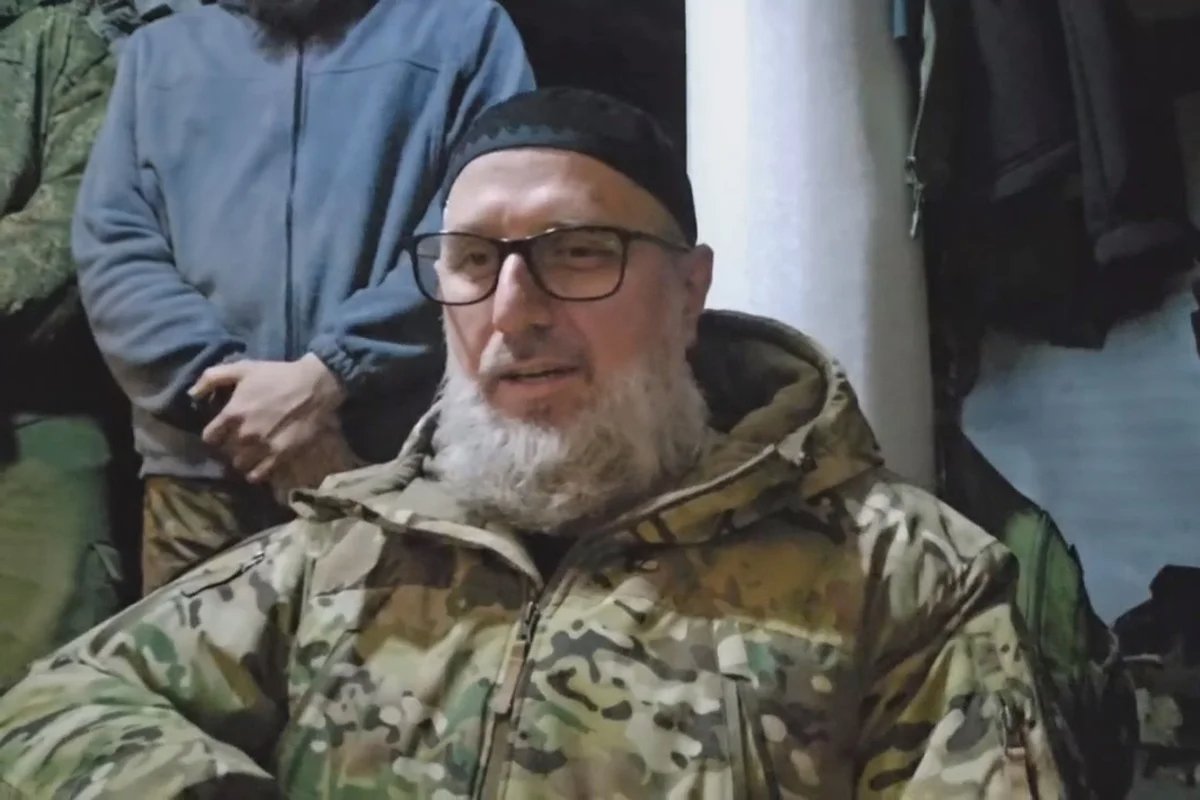
Valid Kuruev. Photo: Apti Alaudinov / Telegram
In the video, the imam says that neither he nor his relatives knew how to take apart or load a machine gun before the war. The video also makes it clear that the Chechens Kadyrov has punished with “holy war” are not entitled to short-term contracts. Like other Russian conscripts, they are sent to the front indefinitely.
In the video, Alaudinov appears to have taken on the role of a merciful commander, promising the disgraced imam he could finally go on leave after a year in the trenches.
“Go on leave with your nephews and son,” Alaudinov is heard to say. “You’ve fought enough.”
Делайте «Новую» вместе с нами!
В России введена военная цензура. Независимая журналистика под запретом. В этих условиях делать расследования из России и о России становится не просто сложнее, но и опаснее. Но мы продолжаем работу, потому что знаем, что наши читатели остаются свободными людьми. «Новая газета Европа» отчитывается только перед вами и зависит только от вас. Помогите нам оставаться антидотом от диктатуры — поддержите нас деньгами.
By clicking the Support button, you agree to the processing of your personal data.
To cancel a regular donation, please write to [email protected]
